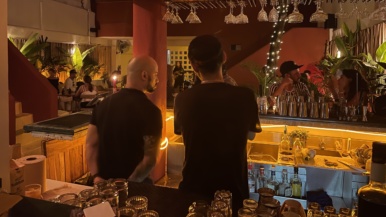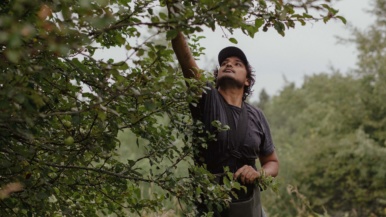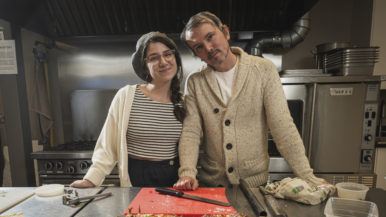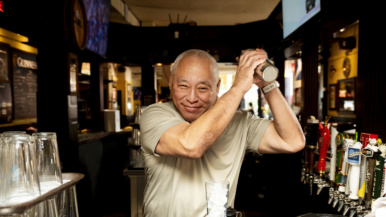I always thought of pot as a fun, harmless distraction—until I realized I couldn’t live without it

The first time I smoked pot, it didn’t work. That’s what I told my friend in the parking lot, as he flicked the roach and we turned back toward our college dorm in upstate New York. He wandered off, and then it hit me. Next thing I knew, I was doubled over, gripped by a long gale of silent, racking laughter. It was as if I suddenly got the joke I’d been missing my whole life. I was in love.
I found my first dealer a few months later, a line cook at the fish and chips restaurant in Halifax where I had a summer job washing dishes. He always gave me my weed pre-rolled into joints and neatly packed into old cassette cases. In the evenings, I’d slip out of my parents’ condo and stroll with exaggerated nonchalance to a nearby lake. There, I’d savour the spliffs until they singed my lips, until my body went from hard spaghetti to cooked noodles, until my skin buzzed with anxious pleasure at the encroaching world around me.
That fall I transferred to Concordia University in Montreal, where my marijuana resources improved dramatically. I met a bike courier who sold me weed by the ounce, half of which I’d sell to a small circle of friends to offset the cost. I developed my preferred technique for rolling: the bud scissored into little green peppercorns, a fingernail’s length of tobacco twisted from the tip of a cigarette, and finally a light dusting of hash, sprinkled like a seasoning on top. Over the next three years, pot became less of an exquisite diversion and more of a familiar texture, a wink from reality. I turned to shrooms and acid for that overwhelming otherworldly sensation; weed was my daily companion, like a wild dog with a crazy grin that travelled with me in my mind.
The end of my undergrad was an unexpected precipice. While some of my friends looped back into academe for more degrees, and others were ready to launch their careers, I fell into an abyss of uncertainty. In the years that followed, I bounced around between random jobs: security guard, oil-patch roughneck, stained-glass apprentice, personal support worker, even church secretary.
As pot became more necessary, life without it became less interesting. I was avoiding real challenges, like pursuing my ambition to be a writer, or getting into a long-term relationship. I moved to Toronto in 2009, and for the next few years, I could hardly do anything without sneaking off for a toke first. With marijuana, it was as though I had a special helmet with a visor that showed me the world exactly as I wanted to see it: at a slight remove and not quite real, like a show that played just for me. Even when I didn’t smoke, the screen was still there.
To make matters worse, the filter changed. Whereas pot had once exposed the charming absurdity of physical existence, it suddenly revealed the pointlessness of life. When I went out with friends, I was at a loss, sitting in awkward silence. My nagging thoughts turned into full-blown obsessions; normal interpersonal conflicts became drawn-out imaginary battles. From the back of my mind I conjured a mantra: “You’re already dead,” I said to myself, over and over again.
In 2012, I found a therapist. At our first meeting she asked me how often I used drugs. “There isn’t a thing in life that I can’t and won’t do high,” I told her, proudly. She said there was no point in working together if I was self-medicating to that extent. To proceed, I had to stop. I was surprised, but I agreed to her terms. Two weeks later, on a Monday at 6 a.m., sitting on the grass in Bellevue Square Park in Kensington Market, I smoked my last joint. Then I blew off work, spent the day in bed, and that evening I joined a 12-step addiction recovery program.
Sitting down in a circle of addicts, listening to them talk plainly about their feelings, I felt like I’d come home. I started going to meetings in a church basement every day. I directed all my contorted thoughts toward the floors and ceilings, while this cohort of intimate strangers listened patiently to one another and waited their turn. I realized I’d been using weed to hide, and it was good to let myself out, even if I felt like a freak.
In the beginning I was ashamed, because the notion of a pot addict seemed so unlikely. I felt like a charlatan among the real addicts. But I soon discovered that those meetings were full of potheads—often slightly embarrassed and secretive, just like me. Since then, I’ve called myself an addict so many times, it has become as natural as saying my name.
After six months of recovery, a friend gave me a job writing for a website. That gig didn’t last long, but it led to another one, and one after that, and more things I wanted to do that I couldn’t have done stoned. I miss getting high, but I’ve found something better: I’ve replaced the comfort of weed with the company of other addicts. A community of former junkies, crackheads, pill poppers, alcoholics and even pot smokers has become my tribe. They’ve helped me realize that unfiltered reality is bigger and stranger than the version I saw through my helmet.
Mark Mann is a writer in Montreal.
Email submissions to memoir@torontolife.com





